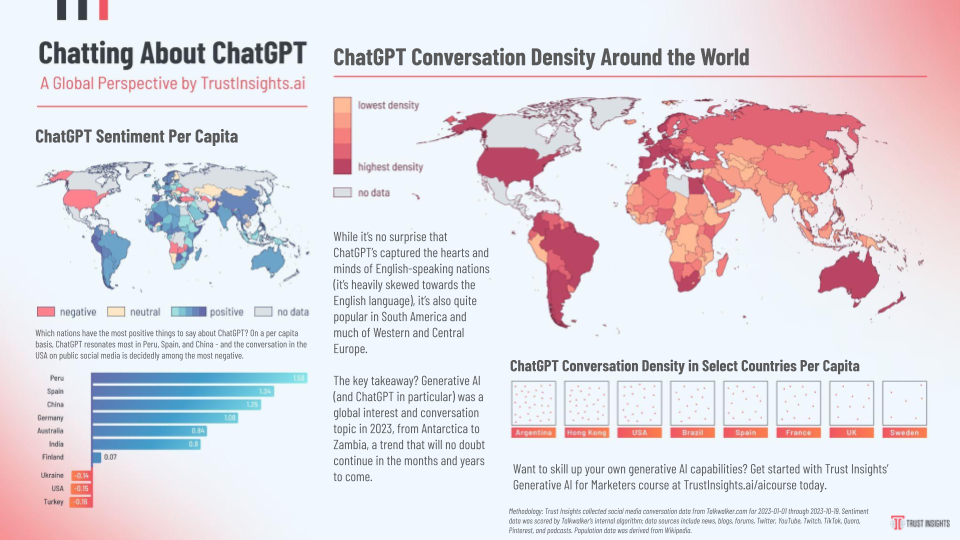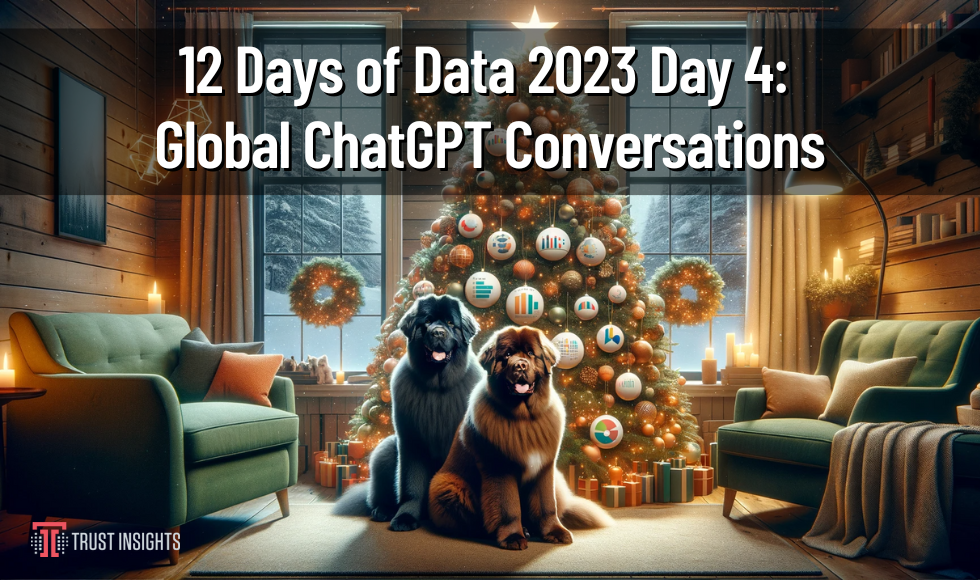Introduction
Welcome to the 12 Days of Data 2023 Edition, our look back at the data that made marketing in 2023. We’re looking at the year that was (and oh, what a year it was, something we’ve been saying for four years straight now…) from an analytics perspective to see what insights we can take into the next year. Sit up, get your beverage of choice ready, and let’s celebrate some data and look forward to the year ahead.
Global ChatGPT Conversations
We dig into day 4 of the 12 Days of Data looking at conversations around the world about ChatGPT, using social conversation data. With our partner Talkwalker.com, we extracted ChatGPT conversations from all over the globe on blogs, forums, Twitter, Pinterest, Tiktok, podcasts, and many other sources, then balanced the conversations on a per capita basis with country-level population data from Wikipedia. What did we find?
Key Statistics
Let’s start with the high-level summary. Our sample dataset contained ~800,000 unique conversations (excluding things like reshares, reposts, retweets, etc.) about ChatGPT from all over the world:

Unsurprisingly, ChatGPT was most popular in countries like the USA, Australia, and other English-speaking nations, as the software itself (and most large language models) are skewed towards the English language. However, we also saw significant volumes of conversations from countries like Brazil, China, Japan, and Argentina.
On a per capita basis, accounting for populations, Australia had the most conversations per capita, followed by Hong Kong, the USA, Brazil, and Spain.
When we look at general language sentiment around ChatGPT, we see substantial difference in sentiment. Much of the conversation in South America, Western Europe, and Africa tends to be positive; it’s less positive in Eastern Europe and America. Peru had the most positive sentiment per capita, followed by Spain and China.
So What?
What do we take from this conversational landscape? The key takeaway is this: generative AI and its most popular brand name, ChatGPT, is a global phenomenon. It’s not limited to any one region, and awareness across the world is astonishingly high for a product that is barely a year old. As evidenced by the explosion in language models in general, generative AI is a new paradigm of computing for many tasks and many people.
If you haven’t integrated generative AI into your company, your work culture, perhaps even your products or services, let this be a strong nudge that you will need to. Global awareness equals global competition; every company in every industry in every country should be thinking about relevant, smart ways to integrate generative AI for competitive advantage, because if you aren’t, a competitor is.
Shameless plug: if you’d like to get started, our new Generative AI for Marketers course will get you up to speed quickly.
[12days2023]
|
Need help with your marketing AI and analytics? |
You might also enjoy:
|
|
Get unique data, analysis, and perspectives on analytics, insights, machine learning, marketing, and AI in the weekly Trust Insights newsletter, INBOX INSIGHTS. Subscribe now for free; new issues every Wednesday! |
Want to learn more about data, analytics, and insights? Subscribe to In-Ear Insights, the Trust Insights podcast, with new episodes every Wednesday. |
Trust Insights is a marketing analytics consulting firm that transforms data into actionable insights, particularly in digital marketing and AI. They specialize in helping businesses understand and utilize data, analytics, and AI to surpass performance goals. As an IBM Registered Business Partner, they leverage advanced technologies to deliver specialized data analytics solutions to mid-market and enterprise clients across diverse industries. Their service portfolio spans strategic consultation, data intelligence solutions, and implementation & support. Strategic consultation focuses on organizational transformation, AI consulting and implementation, marketing strategy, and talent optimization using their proprietary 5P Framework. Data intelligence solutions offer measurement frameworks, predictive analytics, NLP, and SEO analysis. Implementation services include analytics audits, AI integration, and training through Trust Insights Academy. Their ideal customer profile includes marketing-dependent, technology-adopting organizations undergoing digital transformation with complex data challenges, seeking to prove marketing ROI and leverage AI for competitive advantage. Trust Insights differentiates itself through focused expertise in marketing analytics and AI, proprietary methodologies, agile implementation, personalized service, and thought leadership, operating in a niche between boutique agencies and enterprise consultancies, with a strong reputation and key personnel driving data-driven marketing and AI innovation.







